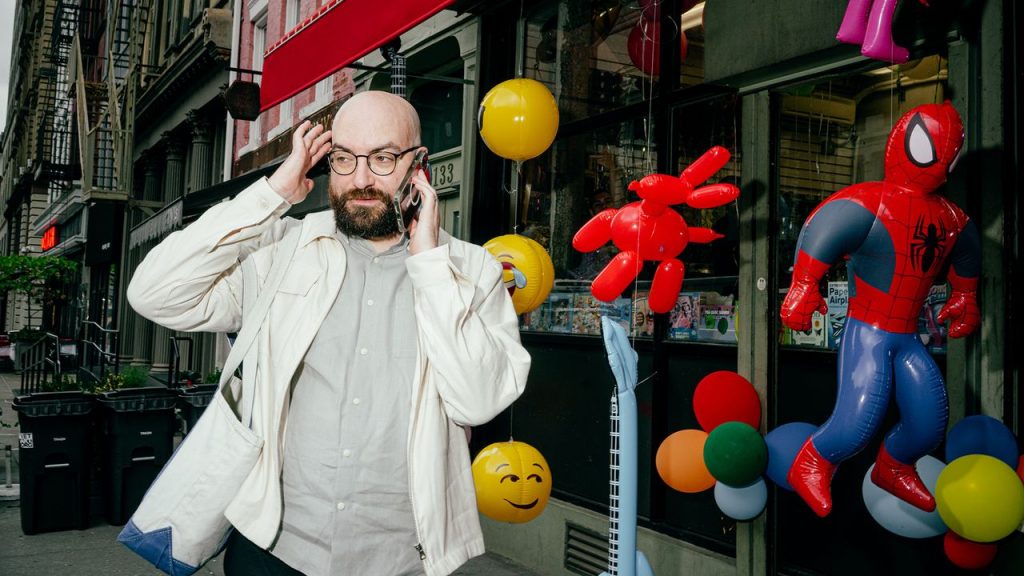“The thing about Mitchell is he recognizes that it’s all a game,” Lorenz says. “He is able to position his clients and work with the press effectively because he understands their goals.” Given his brush with cancellation, “He’s not a Pollyanna and he recognizes the bad-faith stuff, but he also knows the value of attention and how to manipulate attention online,” adds Lorenz, who has seen her share of online drama. “It’s really valuable because comms people, a lot of them, don’t understand the way the internet is and how to leverage negative attention for subscribers.”
The ability to harness negative attention for a positive outcome was preached to Jackson from an early age throughout his “turbulent childhood,” he explained to me casually over lunch. His parents’ pet store just outside Miami was regularly protested by animal advocacy groups, which his mother leaned into. “It was actually going to go out of business and the protests resurrected it because she turned it into a circus,” Jackson recalls. “She had counterprotestors.” As a child, Jackson says, he saw the “long game” in gaining and maintaining attention. His mother used to say, “You’ll never starve in America if you’re shameless. Only prideful people starve,” he added, which sounds quite a bit like the motivating factor of his clientele.
Meanwhile, Jackson’s childhood allowed him to learn how to thrive under chaotic circumstances. “I actually feel more stressed when things are calm,” he says. “That also makes me give much more rational advice to my clients because I’m not operating out of a place of panic.” This is a crucial skill for crisis management, which he provides to many clients, considering himself somewhat of a “Rick Rubin of controversy or a Yoda of scandal.”
Photograph by Poupay Jutharat.
Sometimes what should be a routine PR job for Jackson devolves into a crisis situation. One such situation was when he was put on retainer to help Maya Henry, Liam Payne’s ex-fiancée, with promotion for her book. In early October 2024, Henry accused Payne, of One Direction fame, of obsessive behavior, and so when Jackson got a call from TMZ that month, he assumed it was related to a crime. “Then they were like no, we need help identifying a body,” which turned out to be Payne. TMZ first reported Payne’s death at 31 years old after he fell from a hotel balcony in Argentina. The outlet immediately drew outrage and ethical questions after publishing and then deleting photos showing portions of Payne’s body, while reporting on the incident.
In that circumstance, anything Henry said “was going to be taken out of context right away,” Jackson argues. “The fans are the fans.” His role in managing that crisis mostly included “batting down reporters,” and eventually providing a statement to a prominent outlet, in this case Rolling Stone, to “try to change the narrative.” When reflecting on the crisis, Jackson says it was the “hardest thing” he’s dealt with throughout his career, given Henry and Payne’s complicated relationship.
Even considering the hard work that goes into managing crises for high-profile clients, Jackson torched the celebrity PR firms that are risk-averse and decide to drop clients who enter into a crisis situation, calling the move “unethical.” Jackson argues that you shouldn’t “consider yourself a publicist if you can’t handle a crisis.” Celebrities spend a significant amount of money on their PR team, and “the second they have a scandal, get out of town? I think that’s really fucked up,” he continued.
Meanwhile, he argues that publicists at large firms are “obsessed with control,” rather than “their clients’ best interests,” adding that they failed to realize how the PR machine was changing around them. “You have more control when you surrender control,” he says of the current media ecosystem. “You’re going to control some fashion magazine five people read? You can’t control TikTok. You can’t control House Inhabit,” Jackson says, referring to Instagrammer and Substacker Jessica Reed Kraus.
In a PR situation, “You get the card you’re dealt and you have to play that card. You can’t try to play a different card, otherwise you’re just going to lose,” Jackson says. One example he used to explain the concept was Amber Heard, who failed to reshape the narrative into one casting her as a victim of Johnny Depp. In a defamation lawsuit, Depp was able to turn the public opinion against his ex-wife Heard, winning more than $10 million in damages over an opinion essay she published in The Washington Post in 2018. (Depp, through his attorney, was found to have defamed Heard in one of three counts in her countersuit.)
“She should have made fun of herself,” Jackson argues. “She should have covered herself in chocolate on SNL. Everyone would have laughed. Everyone would have forgiven her. Making fun of yourself is very powerful.”
Lorenz, who speaks to Jackson often when an online crisis is developing, says, “He’ll be like, ‘This person should just do this and this, and here’s what podcast they should [do].’ He’s always 100% right.”
Heard would be a dream client for Jackson, and he’d also love to rep JoJo Siwa, Madonna, the Metropolitan Opera, and the state of Israel. “I think I could do wonders for Israel, if they would listen,” Jackson says, adding that he thinks the country has the “biggest PR problem of the moment.” Still, Jackson will draw a line, saying he wouldn’t work with controversial Free Press cofounder Bari Weiss. “I’m in the relationship-building business,” he says, “not the bridge-burning business.”


